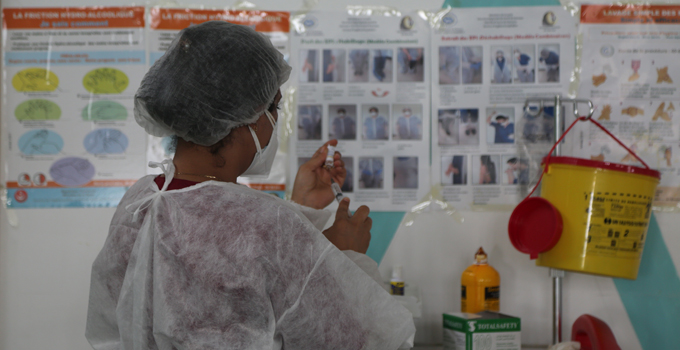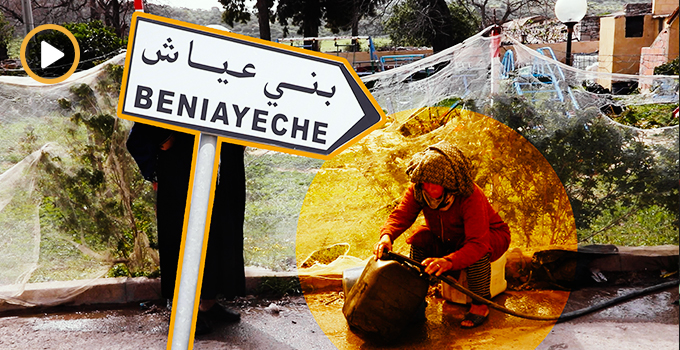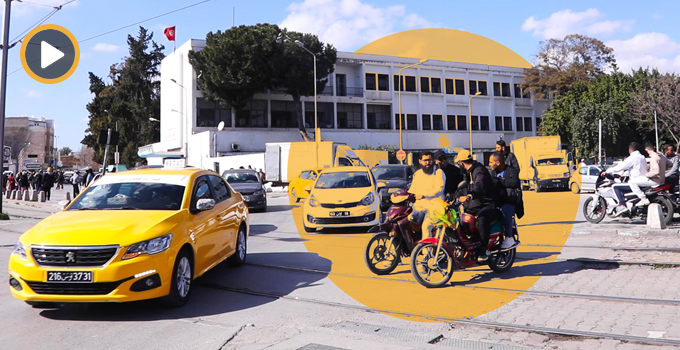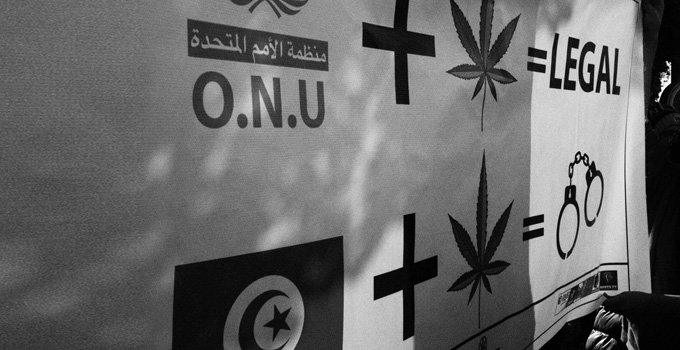
As Tunisians celebrated Eid on Tuesday, crowds of people took to the newly opened, walk-in vaccination centers across the country. The centers—offering vaccinations to anyone over 18-years-old for the first time—had been announced only one day earlier for a limited two-day period. But with the limited time frame, limited vaccine supplies, unclear directives from officials, and short notice given to volunteer organizers, many centers were overwhelmed with some witnessing disruptions, overcrowding, clashes, or the total freezing of operations.
Towards the late afternoon and early evening, some centers had recovered from earlier chaos to streamline the process, according to numerous testimonies gathered by Meshkal/Nawaat. Despite some successfully organized centers, at 18:00 the Prime Minister’s office announced the dismissal of the Minister of Health, and at midnight the Health Ministry cancelled the second day of walk-ins.
In recent weeks, Tunisia has topped the world for daily Covid-related deaths per capita, posting an all-time high of 205 deaths recorded on July 15. Many hospitals have run out of basic materials and lack sufficient staff to cope with the spike in cases, which has seen between around 3000 and 9000 recorded Covid infections every day from June 26 to the time this article was published. Citizen-led efforts to raise awareness of Tunisia’s situation and coordinate aid responses have since been met with international donations of vaccinations and equipment as well as the mobilization of the army in distributing vaccines and the use of some private clinics to ease the burden on the public health sector. While the new vaccine donations have allowed the campaign to speed up, as of July 19, when the Ministry of Health announced the opening of walk-in vaccination centers for July 20, only 825,410 people, or 7% of the population, was fully vaccinated.
In Monastir on Tuesday, doctors left the governorate’s only walk-in vaccination center less than an hour after it had opened its doors after people stormed the center, entering through windows and crowding the doctors, according to Bacem Babba, a 20-year-old who was there to be vaccinated. He told Meshkal/Nawaat that the doctors had said they couldn’t work in such conditions, and only a few dozen people managed to get vaccinated before the doctors left. Babba himself did not manage to get vaccinated, despite showing up and waiting from 11:30 until the center opened at 13:00.
When you entered, the first thing is it wasn’t organized at all,
Babba said.
Babba, like many Meshkal/Nawaat spoke with who had similar experiences in other walk-in centers, received a ticket with a number when he first got to the center and registered. But, like in other centers, the number system broke down and people behind him with higher numbers ended up ahead of him in the line. Tickets in Monastir were printed, unlike many in the Greater Tunis area which were written by hand on torn shreds of copybook papers.
When people who showed up on time—instead of early—learned that tickets had been already been distributed and that vaccination centers had limited doses of vaccines, many of them tried to push their way into the center.
There were clashes in the Rades walk-in vaccination center, as seen in some videos shared on Instagram by user ‘waelfathiii.’ The videos also showed walls torn down and bleeding people receiving medical assistance. Meshkal/Nawaat also heard of numerous cases of people going home to avoid the overcrowding and lack of social distancing in the lines and crowds outside vaccination centers, although most people reported that distancing was more strictly enforced inside of centers.
By 18:00, the Prime Minister’s Facebook account had announced the dismissal of Minister of Health Faouzi Mehdi, who on his own account later announced that he had learned of his dismissal through social media. A subsequent post by the Prime Ministry put all the blame for the Minister of Health and appeared to suggest healthcare policies have been made by the Minister alone, noting: “The decision to call all Tunisians to receive vaccination on Eid Al-Adha is a populist decision, which can be described as criminal, especially because it threatened the health of Tunisians and civil peace.”
The Ministry of Health also announced at almost midnight on Tuesday that it was cancelling the planned second day of walk-in centers on Wednesday following “recorded overcrowding and the violation of health protocols.”
The walk-in vaccination centers were offering Sinopharm to people between 18 and 45 and Astrazeneca to those 45 and older, due to reported rare blood clotting side effects of Astrazeneca affecting younger people more frequently.
Lack of Communication, Delays
In the Marsa walk-in vaccination center, Wael Chettaoui, 24, showed up at 11:15 and didn’t receive his vaccination until about 16:30. He told Meshkal/Nawaat that initially things went quickly and smoothly, with 127 people processed and some of them vaccinated by 13:40, only 40 minutes after the center opened. But then the entire process was frozen for about two hours after those who arrived around 13:00 and didn’t receive tickets stormed the center.
According to Chettaoui, the people storming the center demanded to be vaccinated and began fighting with volunteers—most of them young and with the civil society groups like the Scouts or the Red Crescent. The shouting prevented people from hearing numbers being called, and social distancing “completely broke down.”
Some of those storming the center were pacified when they were accommodated with tickets at another entrance, while police officers were brought to try and bring order, although they appeared to have no clear guidelines, Chettaoui said.
Communication was not great, starting from yesterday,
he said.
While it was unclear how large the stock of vaccines was at the Marsa center, Chettaoui said numerous rumors circulated among the crowds with numbers ranging between 800 and 5000 vaccines. With time, the rumors settled on 800 as the most credible number, although no volunteers or medical staff made any official announcement confirming the amount.
According to Chettaoui, when one person waiting to be vaccinated complained to volunteers about disorganization, one volunteer said: “We know it’s disorganized. We were only called yesterday.”
Some Success Stories
Initially the walk-in vaccination center in Ariana and the center in Menzah were both overwhelmed in the morning, with crowds struggling to get in and ticket systems breaking down, according to several people who were present at each center that Meshkal/Nawaat spoke with.
Houssem Jbeli, 28, who said he showed up at 12:15 at the Ariana center, called the situation there “catastrophic,” describing a total lack of social distancing in a line outside that extended for “kilometers.”
Total chaos. There was no order… no organization, not even a single official to talk to or discuss with him what’s going on exactly. I found thousands of people waiting for a vaccination. I waited long hours in a queue…I don’t know how I managed to do it, but thank God I did it.
“I’m really disappointed, but the bright side in this chaos is I got my vaccination,” he added. But by late afternoon Ariana’s center had become well organized, according to several people who were vaccinated there.
There were “many volunteers from the Red Crescent really very efficiently guiding the people,” said Heger Arfaoui, who went to the Ariana vaccination center at around 16:50 and was already inside by about 17:15. Arfaoui had gone home after trying a vaccination center close to her home in Menzah that turned out to be overly crowded and disorganized. But she tried the Ariana center after receiving calls from friends who told her it was operating smoothly and quickly.
“There weren’t any logistics people, organizers or anything. So people were self-organizing the line,” Arfaoui said adding that police were managing the line when they got closer to the entrance. “The vaccination room—it was so, so quick; you just sit on any chair they show you and someone comes and just jabs you and says: ‘Ok. Goodbye.’” Arfaoui said it lasted only about two minutes inside the vaccination room itself.
“At some point there was a doctor. She had a vaccine in her hand and she was going to jab someone else, and then she walked in front of me and she looked at me and said: ‘Are you done?’ and I said: ‘No.’ So, she took that vaccine, jabbed me and said: ‘Ok goodbye.’ I had the impression they knew what they were doing and they were doing this thing since the morning,” she added.
Hope at Menzah
A similar story of disorder and then order came from the Menzah walk-in vaccination center. When Firas Kefi arrived one and a half hours early at 11:30, to get his vaccination, he received what he said was a very high number on a ticket so he went nearby to wait. He said people were selling tickets with high numbers to other people in line for between 10 and 20 dinars, so the ticket system broke down and people began saying it was first come, first serve. Kefi told Meshkal/Nawaat that he went back around 14:30 to try and get in.
I found not quite a line. It was messy. People were on edge. There was lots of yelling and screaming. The security forces tried to organize, but they couldn’t be as violent as usual because there were so many women and children. There were pushes several times, and I was in one of those and that’s how the door opened, so I got in. The whole thing took 40 minutes. Inside it was organized,
Kefi said.
Sihem Lamine took a video showing the commotion and confusion outside the center with police facing off against some in the crowd. She posted the video on her Facebook account at 13:30.
“In the morning, they announced that tickets were over and there was only 750 doses to give, and that is what drove people crazy,” Lamine told Meshkal, adding that the experience was initially “very traumatizing.” But while Lamine left the vaccination center around 13:30 after waiting an hour and half, she decided to try again later in the day at 17:00.
“I found myself in another country—straight line, organized people, a line that was advancing very well—I couldn’t believe my eyes. There was also a security truck at the door, tens of youth organizing the different lines, and the group that was distributing strange tickets in the morning disappeared somehow,” Lamine wrote in a Facebook post reflection after she successfully got vaccinated around 18:00 at the same center.
Lamine believes that the turnaround in the situation offered a hopeful lesson. “Do not give up on this country, especially to the younger ones amongst you,” she wrote.
This article was produced as part of a reporting partnership between Nawaat and Meshkal.





iThere are no comments
Add yours